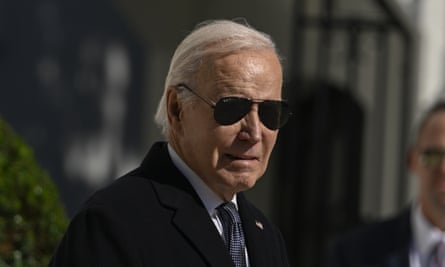Americans are one year away from a presidential election that’s shaping up to be a historically unpopular rematch between the oldest ever sitting president, Joe Biden, a Democrat, and his Republican predecessor, the twice-impeached, serially indicted Donald Trump.
With less than 10 weeks to go before Iowa’s caucuses launch the 2024 Republican nominating contest, much can still change. As it stands, the country appears to be hurtling toward an election few Americans want – but that might be one of the most consequential in modern US history.
Interviews with leading pollsters of both parties offer a portrait of a divided electorate, united only in its pessimism. Americans, surveys show, are deeply disenchanted with their prospects for president, the state of the economy and the direction of the country.
“We have a situation where most Americans want both Trump and Biden not to run,” said the veteran Democratic pollster Stan Greenberg. “That is the context for this election.”
If the top of the ticket looks like 2020, the dark mood of the electorate is reminiscent of 2016, said Frank Luntz, a prominent Republican pollster.
“It looks like 2016, only worse,” he said.
In surveys and in focus groups, Luntz said, voters are expressing a level of disdain for politics and the electoral process that he’s never seen before.
“It’s a feeling like everyone’s being forgotten and disrespected,” he said. “In 2016, that was primarily on the right, which is what led to Donald Trump. But people on the left now feel that way as well.”
Both leading candidates have glaring political liabilities, according to voters.
Trump is the frontrunner for the Republican nomination in 2024, without ever accepting his defeat in 2020, even as he faces felony charges over his attempts to overturn an election that was conducted freely and fairly.
In total, Trump faces 91 felony charges in four separate criminal cases that have effectively tightened, rather than loosened, his grip on the Republican party. In campaign speeches, Trump thrills supporters when he claims to be the only person whose political prospects rise with every indictment.
Grievance once again is at core of his candidacy, Trump’s courtroom appearances often attract more attention than his campaign events. Meanwhile he has skipped all of his party’s presidential debates, leaving the events a scrap for second place.
In the early voting states and among Republicans nationally, Trump continues to dominate, leading his nearest challengers: Ron DeSantis, the Florida governor whose campaign has stalled, and Nikki Haley, his former UN ambassador, whose candidacy has shown signs of momentum in recent weeks.

Trump faces 91 felony charges in four criminal cases that have tightened, rather than loosened, his grip on the Republican party. Photograph: Frederic J Brown/AFP/Getty Images
Biden, all but certain to be his party’s nominee, is asking voters to keep him in office for another four years, well into his ninth decade. Anxiety about his age and fitness – Biden would be 86 years old at the end of a second term – weigh heavily on Biden’s candidacy, though Trump is only three years younger. It is part of the rationale behind the quixotic primary challenge against him by Dean Phillips, the 51-year-old Democratic congressman from Minnesota.
Some Democrats joke warily that, despite notching several significant legislative achievements during his first term, Biden’s age is more than twice his job approval rating, which slipped to a personal low of 37% last month amid sharp erosion in support from Democrats, according to a recent Gallup poll. While voters consistently express deep dissatisfaction over his handling of the economy.
The outcome of the 2024 presidential election, projected to be the most expensive of all time, will probably be decided by a few thousand votes in a handful of critical states.
“This will be a very close general election,” the Biden campaign manager, Julie Chávez Rodrigue,z wrote in a memo, marking the one-year countdown to election day.
In many national and battleground state surveys of a Biden-Trump race, the 2020 rivals are neck and neck. While a survey by the New York Times and Siena College of voters in six battleground states released on Sunday, 365 days from the election, showed Biden trailing Trump in all but one, Wisconsin. The margins ranged from three to 10 percentage points, and reflected an erosion of support among the fragile, multiracial coalition that elected Biden over Trump in 2020.
“Trump has been indicted in 91 times and yet he’s even with or even a couple points ahead of Biden in those surveys,” Luntz said. “If I’m a Democrat, I’m scared out of my mind.”
A Quinnipiac University poll released last week found the presidential race in effect unchanged despite the outbreak of war between Israel and Hamas, a mass shooting in Maine and a courtroom appearance by Trump.
In the poll’s hypothetical matchup, 47% of registered voters say they would support Biden, while 46% say they would support Trump.
“Trump goes to war with the American legal system, while Biden wrestles with military conflicts on two fronts,” said Tim Malloy, a polling analyst with Quinnipiac University. “Despite the swirling tumult, the partisan criticism and rancor, the two candidates are still as tied as tied can be.”
The economy remains a top concern for voters. By official indicators, the US economy has roared back from the pandemic-induced recession. But a wide majority of Americans say they are unhappy with the trajectory of the economy despite consistent reports that inflation is easing and unemployment is close to a 50-year low.

Polls underscore the challenge Biden faces as he tries to sell his economic achievements. Photograph: Anadolu Agency/Getty Images
Polls underscore the challenge Biden faces as he tries to sell his economic achievements – Bidenomics – to voters. A recent Harris poll conducted for the Guardian found that 51% of Americans wrongly believe that unemployment is nearing a 50-year high, while two-thirds of respondents reported it was difficult to be happy about positive economic news when they personally feel financially squeezed each month.
“We’ve never had a situation where the empirical data on the economy and the perceived economic experience by people has been at such a great disjuncture,” said Celinda Lake, a prominent Democratic pollster. “This is the biggest gap we’ve ever had on those two indicators and you’ve got a solid majority of voters who say they’re worse off.”
Democrats, she noted, have never won a presidential election without pulling even with or ahead of Republicans on the economy.
A Trump-Biden rematch, as inevitable as it appears, would cast the country into a highly unpredictable election season with many variables.
The outbreak of war in the Middle East, following the 7 October attack on Israel by Hamas, jolted the electoral landscape. Biden made a wartime visit to Israel to promise US allegiance to a longtime ally. As the death toll in Gaza rises under Israel’s retaliatory bombing campaign, there are signs that the president’s response to the conflict is dividing his fragile electoral coalition and eroding his support, particularly among young people.
Abortion is once again poised to play a significant role. In blue and red states alike, voters mobilized in 2022 against Republican attempts to restrict access to a procedure that was, until last year’s supreme court decision, a constitutional right. Many Republican leaders, including Trump, blamed a backlash over their abortion policies for their worse-than-expected performance in the midterm. A pending legal challenge to outlaw a commonly used abortion pill could spur an even greater backlash in 2024.
Issues of democracy – residual alarm over the January 6 attack on the US Capitol, led by a mob of Trump supporters determined to block Biden’s election; Trump’s campaign pledge to “be your retribution”; his continued attempts to undermine faith in the electoral system; fears of political violence – may also be driving factors, as they were in 2022, said Greenberg.
Many view this as the last election if Trump were to win
Stan Greenberg
“Many view this as the last election if he were to win,” Greenberg said. “Those are the stakes.”
Perhaps nothing is more unpredictable than the prospect of third-party spoilers.
“This is a prime election to have third-party voting being very strong,” Greenberg said.
Robert Kennedy Jr, an anti-vaccine conspiracy theorist and the nephew of president John F Kennedy, is running as an independent after abandoning the Democratic party, as is Cornel West, the philosopher and leftwing scholar. Meanwhile, No Labels, a new political party, is attempting to field a centrist third-party presidential bid in 2024.
How these candidates will affect the race – and which party they will siphon support from – remains unclear. Luntz said there was the potential for third-party candidates to draw far more support than Ross Perot, whose independent presidential campaign won nearly 19% of the popular vote in 1992.
In a four-way race, the Quinnipiac poll found Biden earned 36%, Trump earned 35% and Kennedy and West earned a combined 25%.
However undesirable a Trump-Biden rematch may seem to voters now, the pollsters say partisans of both parties will probably fall in line behind their party’s choice for president.
“The sooner this election can become a contrast the better,” Lake said. “As Joe Biden likes to say himself, don’t judge me by the Almighty, judge me by the alternative. And in that choice he does quite well.”
As Republicans prepare to choose their nominee, Trump’s election-year trials get under way and Biden begins to campaign in earnest, the contours of the presidential contest could change dramatically – or not.
With so much at stake and so little margin for error, the only electoral certainty is the uncertainty.
“A year is an eternity in American politics,” Luntz said.





Comments